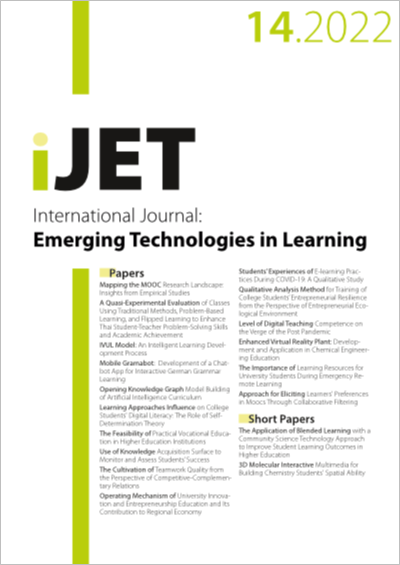A Quasi-Experimental Evaluation of Classes Using Traditional Methods, Problem-Based Learning, and Flipped Learning to Enhance Thai Student-Teacher Problem-Solving Skills and Academic Achievement
DOI:
https://doi.org/10.3991/ijet.v17i14.30903Keywords:
academic achievement, flipped classrooms, problem-based learning, inverted classrooms, Thailand, problem-solving skillsAbstract
This research aimed to synthesize a review of the literature and theory to develop a flipped classroom (FC) learning model to enhance 1st-year bachelor degree Thai student teacher academic achievement (AA) and problem-solving skills (PSS). The sample consisted of 90 student teachers who enrolled in the Digital Media and Learning Innovation (DMLI) course in the Elementary Education Program in the Education and Liberal Arts Faculty at Hatyai University in southern Thailand’s Songkhla province. The study used the FC model in an experimental group (S2) (n=30), while simultaneously comparing it to the control (S1) group using traditional classroom methods (n=31) and another group (S3) using problem-based learning (PBL) (n=29). The FC’s model development was reviewed by nine academic experts. The quasi-experiment took place over four weeks in March and April 2021. All instruments were evaluated by an additional five academic experts whose input evaluation was analyzed using MANOVA statistics with IBM’s®SPSS® for Windows Version 21 program. The results showed that Flipped PARSER group (S2) had AA results significantly higher than both the traditional and PBL groups. Also, S2’s results concerning their PSS were also significantly higher than S1 and S3 as well, while their student teacher satisfaction was also at the highest level. These results showed that the proposed Flipped PARSER Model excels at promoting the development of undergraduate students' motivation, academic achievement, and PSS.
Downloads
Published
How to Cite
Issue
Section
License
Copyright (c) 2022 Cherisa Nantha , Paitoon Pimdee, Jirarat Sitthiworachart

This work is licensed under a Creative Commons Attribution 4.0 International License.


